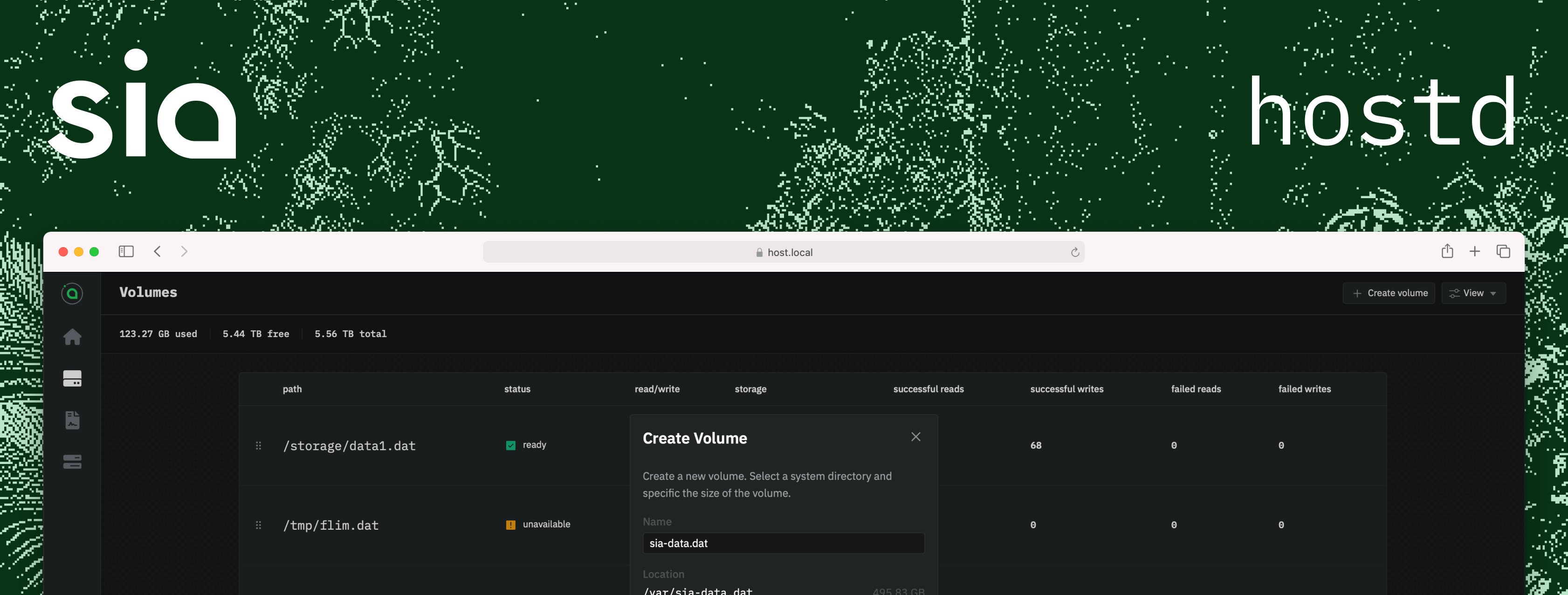A host for Sia.
hostd is an advanced Sia host solution created by the Sia Foundation, designed
to enhance the experience for storage providers within the Sia network. Tailored
for both individual and large-scale storage providers, hostd boasts a
user-friendly interface and a robust API, empowering providers to efficiently
manage their storage resources and revenue. hostd incorporates an embedded
web-UI, simplifying deployment and enabling remote management capabilities,
ensuring a smooth user experience across a diverse range of devices.
- A project roadmap is available on GitHub
- Setup guides are available at https://docs.sia.tech
The YAML config file is the recommended way to configure hostd. hostd includes a command to interactively generate a config file: hostd config. Some settings can be overridden using CLI flags or environment variables.
The host's consensus database, host database, and log files are stored in the data directory.
| Operating System | Path |
|---|---|
| Windows | %APPDATA%/hostd |
| macOS | ~/Library/Application Support/hostd |
| Linux | /var/lib/hostd |
| Docker | /data |
| Operating System | Path |
|---|---|
| Windows | %APPDATA%/hostd/hostd.yml |
| macOS | ~/Library/Application Support/hostd/hostd.yml |
| Linux | /etc/hostd/hostd.yml |
| Docker | /data/hostd.yml |
The default config path can be changed using the HOSTD_CONFIG_FILE environment variable. For backwards compatibility with earlier versions, hostd will also check for hostd.yml in the current directory.
9980- UI and API9981- Sia consensus9982- RHP29983- RHP39984- RHP4
directory: /etc/hostd
recoveryPhrase: indicate nature buzz route rude embody engage confirm aspect potato weapon bid
http:
address: :9980
password: sia is cool
syncer:
address: :9981
bootstrap: true
consensus:
network: mainnet
indexBatchSize: 100
rhp2:
address: :9982
rhp3:
tcp: :9983
log:
level: info # global log level
stdout:
enabled: true # enable logging to stdout
level: info # log level for console logger
format: human # log format (human, json)
enableANSI: true # enable ANSI color codes (disabled on Windows)
file:
enabled: true # enable logging to file
level: info # log level for file logger
path: /var/log/hostd/hostd.log # the path of the log file
format: json # log format (human, json)HOSTD_API_PASSWORD- The password for the UI and APIHOSTD_WALLET_SEED- The recovery phrase for the walletHOSTD_LOG_FILE- changes the location of the log file. If unset, the log file will be created in the data directoryHOSTD_CONFIG_FILE- changes the path of thehostdconfig file.
-dir string
directory to store hostd metadata defaults to the current directory
-http string
address to serve API on (default "localhost:9980")
-log.level string
log level (debug, info, warn, error) (default "debug")
-name string
a friendly name for the host, only used for display
-network string
network name (mainnet, testnet, etc) (default "mainnet")
-openui
automatically open the web UI on startup (default true)
-syncer.address string
address to listen on for peer connections (default ":9981")
-syncer.bootstrap
bootstrap the gateway and consensus modules (default true)
-rhp2 string
address to listen on for RHP2 connections (default ":9982")
-rhp3 string
address to listen on for TCP RHP3 connections (default ":9983")
-env
disable stdin prompts for environment variables (default false)hostd uses SQLite for its persistence. A gcc toolchain is required to build hostd
go generate ./...
CGO_ENABLED=1 go build -o bin/ -tags='netgo timetzdata' -trimpath -a -ldflags '-s -w' ./cmd/hostdhostd includes a Dockerfile which can be used for building and running
hostd within a docker container. The image can also be pulled from ghcr.io/siafoundation/hostd:latest.
Be careful with port 9980 as Docker will expose it publicly by default. It is
recommended to bind it to 127.0.0.1 to prevent unauthorized access.
Create a new file named docker-compose.yml. You can use the following as a template. The /data mount is where consensus data is stored and is required. Change the /storage volume to the path of your storage drive. If you have additional mount points, add them.
services:
host:
image: ghcr.io/siafoundation/hostd:latest
ports:
- 127.0.0.1:9980:9980/tcp
- 9981-9983:9981-9983/tcp
volumes:
- hostd-data:/data
- /storage:/storage
restart: unless-stopped
volumes:
hostd-data:Run the following command to generate a config file for your host. Do not change the data directory from /data.
docker compose run -it host config
After creating a config file, it's time to start your host:
docker compose up -d
docker build -t hostd .